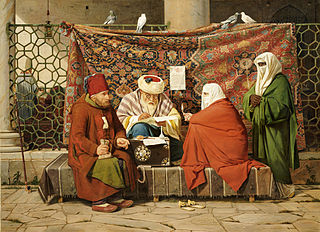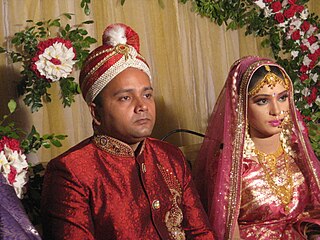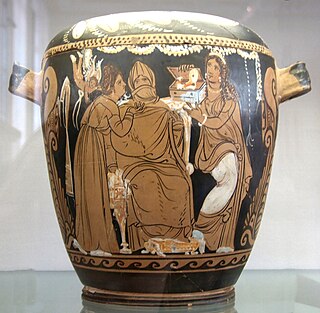Related Research Articles
A dowry is a payment, such as land property, monetary, cattle or any commercial asset that is paid by the bride's family to the groom or his family at the time of marriage.

In Islam, a mahr is the bride wealth obligation, in the form of money, possessions or teaching of verses from the Quran by the groom, to the bride in connection with an Islamic wedding. While the mahr is often money, it can also be anything agreed upon by the bride such as jewelry, home goods, furniture, a dwelling or some land. Mahr is typically specified in the marriage contract signed upon marriage.

Safiyya bint Huyayy was a Jewish woman from the Banu Nadir tribe. After the Battle of Khaybar in 628, she was widowed and taken captive by the early Muslims and subsequently became Muhammad's tenth wife. Like all other women who were married to Muhammad, Safiyya was known to Muslims as a "Mother of the Believers". Their marriage produced no children and ended with Muhammad's death in Medina in 632.
A total of eleven women are confirmed as having been married to Muhammad, the founder of Islam. As a sign of respect, Muslims refer to each of these wives with the title Umm al-Muʼminin, which is derived from 33:6 of the Quran.

In Islamic law (sharia), marriage is a legal and social contract between two individuals. Marriage is an act of Islam and is strongly recommended. Polygyny is permitted in Islam under some conditions, but polyandry is forbidden.

In Islam, nikah is a contract exclusively between a man and woman. Both the groom and the bride are to consent to the marriage of their own free wills. A formal, binding contract – verbal or on paper – is considered integral to a religiously valid Islamic marriage, and outlines the rights and responsibilities of the groom and bride. Divorce in Islam can take a variety of forms, some executed by a husband personally and some executed by a religious court on behalf of a plaintiff wife who is successful in her legal divorce petition for valid cause. Islamic marital jurisprudence allows Muslim men to be married to multiple women.

Divorce according to Islamic law can occur in a variety of forms, some initiated by a husband and some by a wife. The main categories of Islamic customary law are talaq, khulʿ and faskh. Historically, the rules of divorce were governed by sharia, as interpreted by traditional Islamic jurisprudence, though they differed depending on the legal school, and historical practices sometimes diverged from legal theory.

An Islamic marriage contract is considered an integral part of an Islamic marriage, and outlines the rights and responsibilities of the husband and wife or other parties involved in marriage proceedings under Sharia. Whether it is considered a formal, binding contract depends on the jurisdiction. Islamic faith marriage contracts are not valid in English law, nor American Law. Because of this, some Islamic Marriage Officiants will only officiate a marriage after the couple had been legally married in court.

Dower is a provision accorded traditionally by a husband or his family, to a wife for her support should she become widowed. It was settled on the bride by agreement at the time of the wedding, or as provided by law.
Combined marriage is a form of polyandry that existed in the pre-Islamic period in the Arabian peninsula.
Many social changes took place under Islam between 610 and 661, including the period of Muhammad's mission and the rule of his immediate successor(s) who established the Rashidun Caliphate.

The topic of Islam and children includes Islamic principles of child development, the rights of children in Islam, the duties of children towards their parents, and the rights of parents over their children, both biological and foster children.
Arabic weddings are ceremonies of matrimony that contain Arab influences or Arabic culture.

Muslim marriage and Islamic wedding customs are traditions and practices that relate to wedding ceremonies and marriage rituals prevailing within the Muslim world. Although Islamic marriage customs and relations vary depending on country of origin and government regulations, both Muslim men and women from around the world are guided by Islamic laws and practices specified in the Quran. Islamic marital jurisprudence allows Muslim men to be married to multiple women.

Nikah mut'ah Arabic: نكاح المتعة, romanized: nikāḥ al-mutʿah, "pleasure marriage"; temporary marriage or Sigheh is a private and verbal temporary marriage contract that is practiced in Twelver Shia Islam in which the duration of the marriage and the mahr must be specified and agreed upon in advance. It is a private contract made in a verbal or written format. A declaration of the intent to marry and an acceptance of the terms are required as in other forms of marriage in Islam. The Zaidi Shia reject Mutah marriage.

Bride price, bride-dowry, bride-wealth, bride service or bride token, is money, property, or other form of wealth paid by a groom or his family to the woman or the family of the woman he will be married to or is just about to marry. Bride dowry is equivalent to dowry paid to the groom in some cultures, or used by the bride to help establish the new household, and dower, which is property settled on the bride herself by the groom at the time of marriage. Some cultures may practice both simultaneously. Many cultures practiced bride dowry prior to existing records.
Walī is an Arabic word primarily meaning primarily "ally", from which other related meanings with Islamic cultural tones derive, such as "ally of God" or "holy man/saint", etc. "Wali" can also mean a "legal guardian", or ruler; someone who has "Wilayah" over somebody else, and in fiqh is often "an authorized agent of the bride in concluding a marriage contract ",

In Islam, human sexuality is governed by Islamic law, also known as Sharia. Accordingly, sexual violation is regarded as a violation of moral and divine law. Islam divides claims of sexual violation into 'divine rights' and 'interpersonal rights' : the former requiring divine punishment and the latter belonging to the more flexible human realm.

Marriage in ancient Greece had less of a basis in personal relationships and more in social responsibility, however the available historical records on the subject focus exclusively on Athens or Sparta and primarily on the aristocratic class. According to these records, the goal and focus of all marriages was intended to be reproduction, making marriage an issue of public interest. Marriages were usually arranged by the parents; on occasion professional matchmakers were used. Each city was politically independent and each had its own laws concerning marriage. For the marriage to be legal, the woman's father or guardian gave permission to a suitable man who could afford to marry. Daughters were usually married to uncles or cousins. Wintertime marriages were popular due to the significance of that time to Hera, the goddess of marriage. The couple participated in a ceremony which included rituals such as veil removal, but it was the couple living together that made the marriage legal. Marriage was understood to be the official transition from childhood into adulthood for women.

In classical Islamic law, a concubine was an unmarried slave-woman with whom her master engaged in sexual relations. Concubinage was widely accepted by Muslim scholars in pre-modern times. Most modern Muslims, both scholars and laypersons, believe that Islam no longer permits concubinage and that sexual relations are religiously permissible only within marriage.